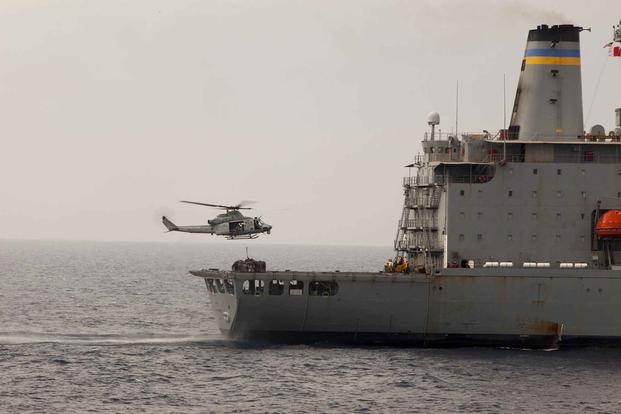The Marine Corps’ top general expressed serious regrets over the fact that Marines were not available to help in two major crises in recent months because of a lack of available Navy ships to position units in nearby waters.
“Places like Turkey or, the last couple of weeks, in Sudan — I feel like I let down the combatant commander,” Commandant Gen. David Berger told members of the House Armed Services Committee on Friday.
“[Gen. Michael Langley] didn’t have a sea-based option — that’s how we reinforce embassies, that’s how we evacuate them,” Berger added, referring to the head of U.S. Africa Command.
Read Next: 1st Woman to Take Top Enlisted Job at Army Special Ops
The remarks come amid a growing debate in the halls of Congress over how the Navy is meeting the legal requirement to operate 31 amphibious ships for the Marines, designed to be used as maritime operations hubs. Corps leaders and even lower-ranking officers have been stressing that they need those ships at sea to fulfill their missions.
In this year’s budget proposals, the Navy suggested that it would drop its amphibious ship numbers below that 31 ships threshold by retiring older dock landing ships, or LSDs, while pausing orders of the replacement San Antonio-class amphibious transport dock ships, or LPDs.
“We have some LSD platforms, for example, that cannot be made operationally available to fulfill the requirements that we need,” Secretary of the Navy Carlos Del Toro said in the same hearing.
Meanwhile, reporting from USNI in March revealed that the pause in buying more LPDs didn’t come from the Navy but rather from the Office of the Secretary of Defense. Pentagon leaders told reporters at the time that they felt that the current array of amphibious ships was “sufficient.”
The devastating earthquake that struck Turkey in February and killed more than 50,000 people and the more recent civil conflict in Sudan that prompted the evacuation of 70 people from the U.S. embassy in Khartoum have provided clear examples for Berger of the value of always having a Marine Expeditionary Unit (MEU) nearby.
“That’s the best chance you have of responding to a crisis immediately, and there needs to be one in the Pacific and one in [the] Mediterranean, Africa, [Middle East] area 12 months a year,” Berger told Congress.
In the fleet, Navy leaders seem to agree.
During a recent Marine-sponsored trip to the amphibious assault ship USS Bataan, Capt. Martin Robertson, the commander of Amphibious Squadron Eight, told reporters that the ability for Marines to base off of amphibious ships is “a very important capability” that allows the two services to not only extract Americans from harm’s way but also offer foreign humanitarian assistance and disaster response “if we’re deployed forward somewhere.”
“We can move very quickly and get into the area and get that initial help flowing,” he added.
Col. Dennis Sampson, the commander of the 26th MEU, also stressed to reporters that “our presence does matter [and] amphibs are critically important for the Marine Corps.”
Berger made clear that he views the capability as key to America’s standing in the world.
“That’s how we evacuated citizens out of Lebanon, that’s how we went into Afghanistan in 2001,” Berger said Friday. “Here’s my concern: The first time this nation can’t respond to a crisis and one of our adversaries can — probably the last time we get asked.”
— Konstantin Toropin can be reached at [email protected]. Follow him on Twitter @ktoropin.
Related: Why the US Evacuation from Sudan Left Americans Behind
Show Full Article
Read the full article here


